Lost Sports of the Summer Olympics
Baseball, tug-of-war, and nine other team medal sports that were phased out of the Summer Games

As the nation turns its lonely eyes to the first baseball-free Summer Olympics in two decades, it's hard not to feel the cold ache of loss—suddenly there's a gaping, diamond-shaped hole in our hearts and our TV programming.
Misery does, however, love company, so here's an inventory of some beloved—and some less beloved—team sports that the Olympics abandoned along the way. Some were scratched from the program immediately after their inaugural inclusion (chalk it up to trial and error, or maybe trial and unpopularity); others hung around a while before eventually being discontinued by the IOC. But take heart, baseball fans: At least one made a comeback.
Tug-of-war
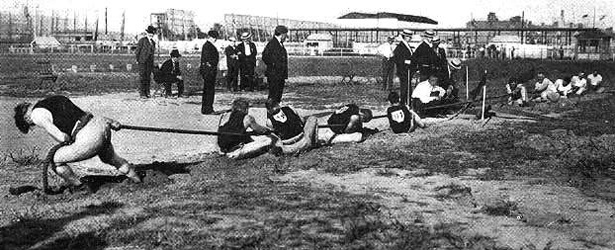
Among the most missed Olympic sports of yesteryear is undoubtedly the tug-of-war event. Its final appearance in the Summer Olympiad was back in 1920 in Antwerp, when an eight-man British team mostly composed of London policemen brought home the gold.
Doubles events: Doubles croquet, doubles rackets, and tandem cycling

It's been a mixed-bag kind of century for two-person teams in the Summer Olympics. For every tan, winsome beach volleyball duo, there's an equivalently sad-eyed pair of out-of-work tandem cyclists.
Doubles croquet was eliminated after a single appearance in 1900; the French gold medalists never actually competed, however, as they were the only competitors in their field. Doubles rackets, the two-person version of a centuries-old indoor European game widely considered an early predecessor of tennis, was a similar swing-and-a-miss eight years later: After Britain swept all three medals in the both the doubles and singles categories, the sport never returned to the Olympic games.
Tandem cycling, on the other hand, enjoyed a longer stay at the Summer Games, with a place on the program from 1906 to 1972. The sport, known for the phenomenal speeds each team of cyclists could generate together, disappeared from the Olympics after the Munich games; the International Olympic Committee, concerned with the "virtually unmanageable proportions" to which the Games had grown, met in Bulgaria in the autumn of 1973 with the intent of trimming down the Olympic program. In the end, the IOC voted to establish limits on the number of competitors in six sports, as well as to abolish tandem cycling from the roster along with nine other sporting events (among them a 50-kilometer walk, four slalom events in kayak racing and canoeing, and the 300-meter distance in rifle shooting). Tandem cycling maintained some momentum after its Olympic demise, but USA Cycling eliminated its tandem race last year.
Baseball
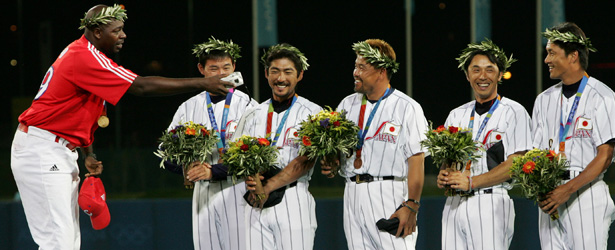
Baseball, last seen in the Olympics just four years ago in Beijing, is the latest casualty of an industry-wide battle between professional and national sporting associations. Because the Games take place during the American Major League Baseball season, professional baseball players don't enjoy the same automatic availability as their counterparts in the NBA and the NHL—the latter of which puts its season on hold during the Games (for now). Franchise teams have historically balked at the idea of lending out their top players for a two-week stretch in the middle of the season, and the resulting U.S. teams composed of "prospects and older fringe big leaguers" (as ESPN's Keith Law puts it) have failed to achieve any real dominance in their own national pastime—most notably in 2004, when a team of collegians fell short of even qualifying for the Athens games.
The league's tight grip on its players depleted the talent pool of other Olympic baseball teams throughout the world, too; thus, when each of the 28 existing sports was put to a secret vote by the IOC in 2005, baseball was one of two sports that failed to receive a majority. The other was softball.
Craig Reedie, a British IOC member, told NBC Sports he blamed the lack of major-league baseball players for the sport's exclusion from the 2012 Games. Similarly, Cuban Baseball Federation president Carlos Rodriguez said, "Those who bear most of the blame are the owners of the professional leagues who refuse to free up their ballplayers to compete."
Softball
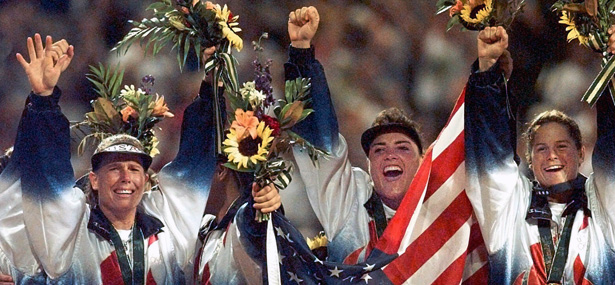
When baseball was booted from the Olympic program in 2005, it took its sister sport with it—a move that shocked even softball's elite.
The sport's surprising exclusion was chalked up to the increasing European influence within the IOC. Europeans reportedly held a near-majority within the Committee—a less-than-promising scenario for a game with larger followings in the Americas and Asia.
Dot Richardson, however, wondered if a force darker than apathy had been at work. "I've always seen in athletics an anti-American sentiment throughout the world—most of it is through jealousy or envy," the two-time gold medal-winning American infielder told NBC Sports after the announcement. Was it anti-American spite? Maybe. Team USA had, after all, nabbed gold medals at every Olympic Games since softball's first inclusion in 1996, and had outscored its opponents 51 to 1 in 2004. (The U.S. women remained undefeated at the Summer Olympics until the gold-medal match in 2008, where they fell 3-1 to Japan.)
Polo
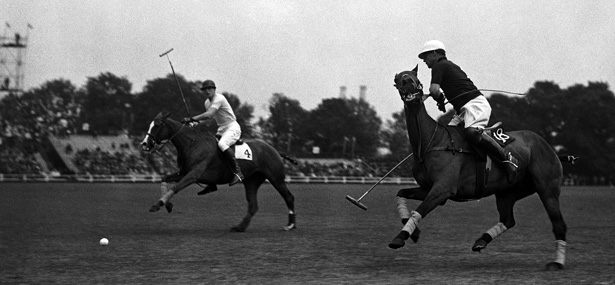
Polo experts say their celebrated Persian horse-and-mallet pastime saw its golden age come and go in the first 50 years of the twentieth century. Even in its glory days, though, polo had a spotty attendance record at the Summer Olympics, appearing at only five Games of the first 10 (1900, 1908, 1920, 1924, and 1936).
Polo's heyday ended abruptly in the late 1930s—probably a casualty of World War II, says Brenda Lynn, the director of development at the Museum of Polo in Florida. As times of austerity set in, she says, it became less and less practical to continue international competition of an expensive sport like polo. The logistical hardships and astronomical costs of shipping polo equipment (read: horses) overseas didn't help much, either, and the so-called Sport of Kings was discontinued as an Olympic sport after the 1936 Games. The greater international polo scene went dormant around the same time, and struggled to regain any momentum stateside until the 1970s.
Today, polo is enjoying a healthy resurgence worldwide: More than 60 countries are members of the Federation of International Polo, and the sport has its own World Championships. But, alas, polo is nowhere to be found in today's Olympic Games—except on the breast of Team USA's Ralph Lauren uniforms.
Cricket
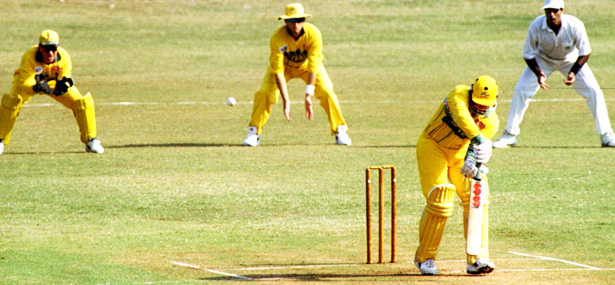
Cricket's popularity was so minimal at the turn of the century that the sport lasted only a single match at the Olympics: In 1900, the only two teams competing were an English and a French team (the latter of which, legend has it, was composed almost entirely of British Embassy employees). England won the gold-medal match by a whopping 158 runs—and after the almost comically one-sided match served as both its Olympic debut and its swan song, Olympic cricket was put out of its misery by the IOC. According to The Guardian, reports after the match summed up the contest as follows: "The French temperament is too excitable to enjoy the game, and no Frenchman can be persuaded to play more than once."
Basque pelota
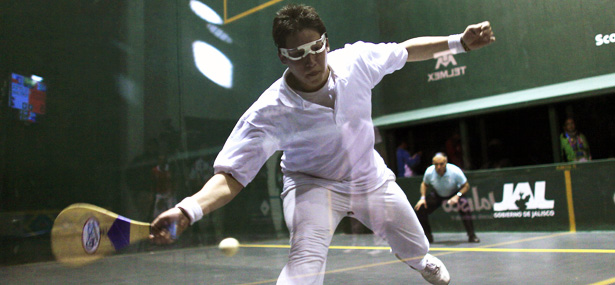
Basque pelota was first and last seen at the Olympics in 1900. The hardcourt game, believed to share roots with modern tennis and handball, remains a beloved pastime in specific parts of France, Spain, and several Latin American countries; outside Europe, a variation of the game is known as jai alai. Enthusiasm for the sport was middling at best at the turn of the century: Only two teams participated in its inaugural Games. Spain beat France in its single Olympic medal match ever, and Basque pelota was scrapped from the lineup soon afterward. Though Basque pelota reappeared as a demonstration sport in Amsterdam in 1924, in Mexico City in 1968, and again in Barcelona in 1992, it would never again award Olympic medals to its competitors.
Lacrosse
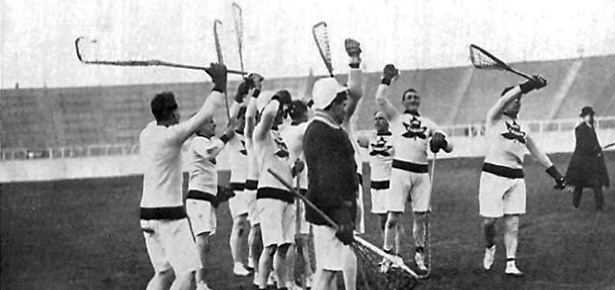
The Olympics have always been a hot spot for geopolitical sports symbolism (see: 1980's Miracle on Ice, Jesse Owens' four gold medals in Nazi Germany, and so on). But lacrosse's Olympic debut had a colonial flavor all its own: Lacrosse originated in the 19th century in the Eastern Woodlands of Canada when English-speaking Montreal frontiersmen adapted the Mohawk ball game of tewaarathon, and according to an article by the University of Victoria's Christine O'Bonsawin, Native Americans and white settlers of the region were facing off in lacrosse as far back as 1844.
So it wasn't surprising when, 60 years later, both the Winnipeg Shamrocks and a team known only as the Mohawk Indians showed up to St. Louis to represent Canada in the 1904 Olympics. The Shamrocks traveled back to Canada afterward with gold medals, while the Mohawk Indians took home bronze. Canada earned another gold medal four years later in London.
It's unclear exactly why lacrosse was omitted from subsequent Olympics. Perhaps global interest levels waned. Or perhaps it suffered the same wartime fate as polo, going out of style with the other equipment-intensive sports of the day as resources became scarce. Today, athletic retailers sell lacrosse helmets and sticks for upwards of $200 each, while gloves and pads are both routinely priced in the $100-$150 range. But that hasn't stopped lacrosse from experiencing a massive resurgence in the United States, as youth participation rates stateside nearly tripled in the years between 2001 and 2010.
Rugby union
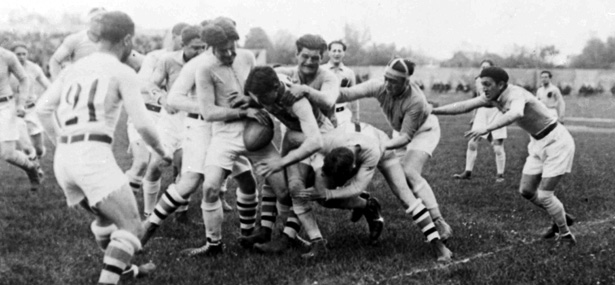
Few early modern Olympic sports saw such even competition among the continents as rugby union. Last seen at the Olympics in 1924, rugby union (a popular version of the sport involving 15 players per team) awarded gold medals once to France, twice to the United States, and once to an Australia-New Zealand team then known as Australasia in its four appearances at the Summer Games. And according to the International Rugby Board, it was the last medal sport to use an oblong ball in the Games.
Like baseball, rugby was the unlucky victim of a shift in the Olympic regime: The "hooligans' game" got the axe after one Count Henri de Baillet-Latour took over as President of the IOC in 1925—legend has it that the Count simply wasn't as fond of the game as his rugby-playing presidential predecessor, the Baron Pierre de Coubertin. Despite some young Dutchmen's best efforts to keep the game alive for the 1928 Amsterdam Olympics, rugby's Olympic aspirations fell by the wayside and were largely forgotten.
That is, until 2009—when, in the new absence of baseball and softball, the IOC voted to reinstate rugby and golf to the field of 28 summer events. Rugby sevens, a variation of rugby played with seven players per team, will be resurrected in the 2016 Summer Games in Rio de Janeiro.